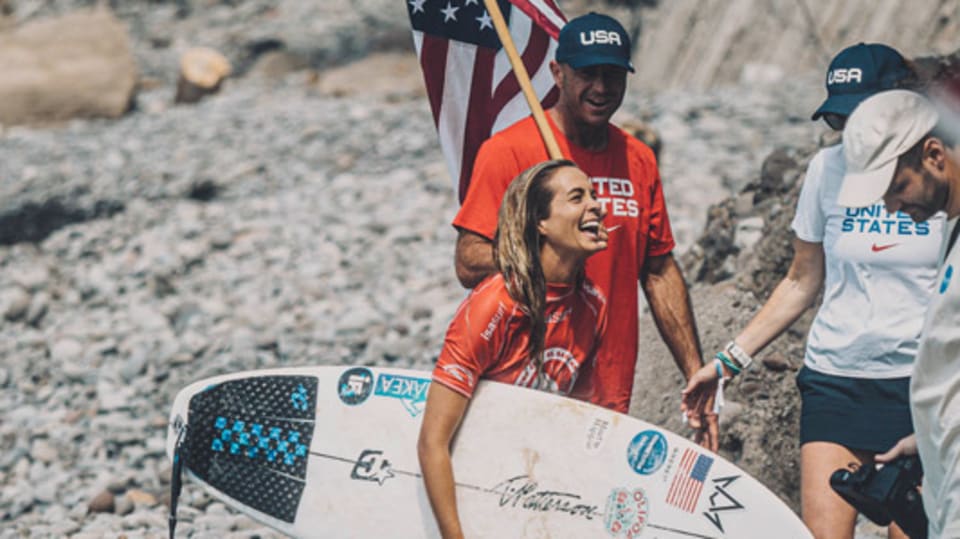US surfer Brianna Cope opens up about her birth defect: 'It's my superpower'
Born with a physical impairment, Brianna Cope has spent the majority of her life trying to hide it. But now that has changed. The USA surfer is embracing the defect and wants to send a message to others who continue to struggle with bullying and a lack of confidence.

Most people choose to surf simply because they enjoy it. Brianna Cope chose to surf because it also helped her to hide her biggest secret.
Born with a deformed left hand, Cope used to hide it under the water while surfing to avoid getting asked questions.
A childhood filled with bullying, closed-fisted photographs, and post-school tears taught her how to escape the unwanted attention – and gave her the resilience she now shows in her surfing career.
"Growing up, it's always so hard to be labelled as different. When I was a kid, I thought everyone was different and I was the one with the normal hand. Being born with a birth defect and having kids pick on you, it really is so tough," Cope told Olympics.com.
"I was always so shy, so embarrassed. But that taught me though, to overcome. I bring it back to competing because I have the drive and the tenacity from being bullied and from being pushed down so much that I'm able to overcome. I feel like it translates into my surfing and how I am as a person."
Olympics.com spoke to the 28-year-old surfer after she made the USA national team at the 2023 ISA World Surfing Games about the lessons she learned from getting bullied and the message she wants to send to others dealing with similar struggles.
Open hand to closed fist
Brianna Cope did not always try to hide her hand. As a child, she posed for photos smiling and with her hands open and relaxed.
But when she went to elementary school, her thinking changed, as did the photos.
“I was extremely bullied. My mom said all through first and second and third grade I would cry every single day, not want to go to school. You can even see the transition in my baby photos (where) my hands are always open. And then when I started going to elementary, I'd always close my hands in photos. I didn't want to be asked about it,” Cope said.
The bullying did not let up until Cope was in high school. There she earned a new reputation as a competitive surfer.
_"_High school, everyone was a lot nicer because I was surfing and competing, so they were like, ‘Well, that's kind of cool’. But elementary and middle school was really, really tough,” Cope said. “Going through bullying, though, makes you a stronger person overall because you have to overcome so many obstacles. Everyone gets bullied for their own ways, but actually having something physically wrong where they can like point it out is really, really challenging."
Instead of letting the bullies get her down, Cope channelled her distress into becoming a better surfer.
She discovered that when it came to surfing, she was not only able to hide her hand from unwanted stares, but also use it to her advantage.
“I think I'm faster at paddling because I don't have fingers so I don't have any drag,” Cope said. “I'm really fast. It's my superpower for sure.”
She started surfing in Hawaii at the age of 4 and entered her first surf competition six years later. As a junior, Cope competed with current world No.6 Tatiana Weston-Webb and “soul surfer” Bethany Hamilton, who has since become a close friend.
Cope almost qualified to the World Championship Tour in 2014 and 2015 and was called up to Team USA for the 2023 ISA World Surfing Games in El Salvador.
And as she became more comfortable on the water, Cope also became more comfortable talking about her hand.
Realising the positive impact her words had, Cope went public about her birth defect, including talking about it in a 2019 film Surfing to Cope.
"I absolutely love talking about it. I think it's important because with social media so many kids are also bullied and people can relate,” she said. “It was important that I went through those feelings because it taught me to be strong. I needed to feel like that when I was a kid because, if not, I wouldn't have found that self-confidence and drive. All those hard times have taught me to never give up."
Making the most of a last-minute call-up
Not giving up is the mentality Cope applies to surfing competitions as well.
Accepting a last-minute call-up to the national team after not competing for several months is one such example.
"I haven't put a jersey on in a long time,” Cope said. "It was a total surprise. I had to get my magic boards that I put on ice at my house and just get them all ready.
"I could have easily said no to this event because I was nervous and I would be intimidated being against Carissa (Moore) and Caroline (Marks), but I think it's important to push yourself and get out of your comfort zone."
While Moore and Marks were training on the waves, competing and finishing one and two at Surf Ranch Pro, Cope was also in full training mode - but for a different sport.
A week before the World Surfing Games the lifelong surfer ran her first half-marathon, the excruciating Hell on the Hill race in Georgia where runners go up and down a hill for 60 laps.
Cope plans to run another half-marathon in October, for a cancer charity.
“I just love pushing myself and seeing where I can go,” Cope said of her newfound running ambitions. “It's so fun.”
